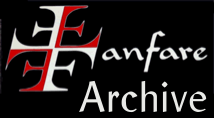Fanfare Contributor Bio
Steven Kruger
My path to music criticism has been an unusual one. And the adage to describe it involves the notion of “choosing one’s parents wisely.” I had the unusual experience of growing up in a musical family that rejected music as a profession. We are Scotch-Irish and imaginative on one side of the family, but not musical–––and very musical but rather seriously German on the other, with the occasional deficits of humor and disapproval of frivolity that description suggests. On the German side we descend from Phillip Spitta, the biographer of Bach, whose heavy tomes from the 1880s sat unread on our bookshelves, as I suspect they do on shelves of music stores to this day. My father had been friends, as a child, with the son of Arnold Rosé, the famed concertmaster of the Vienna Philharmonic under Mahler, and managed to learn the violin. But by the time I was born in New York in 1947, he was an accountant with a passion for management and exercise, not music.
I was raised largely in Latin America during the 1950s, first Mexico City, then the unpaved eastern reaches of Cuba’s sugar country. We owned only my child’s phonograph and a few Burl Ives records during those years. There was no classical radio. And I never attended a concert until going away to school at Phillips Exeter, where I first encountered and made use of a good record library. But that comprehensive collection turned me into an armchair musician.
Although I was never trained to read music and do so badly to this day, the sheer amount of listening I undertook amounted to a musical education, as did exposure to musical friends and the opportunity to pound on grand pianos in practice rooms. Experimentation with component sound equipment turned me then, as now, into a “sound guru” for stereo buffs. I was an early convert to the idea of ambience retrieval, and indeed use a passive surround-sound circuit in my stereo system to this day.
I went on to complete my education at Princeton, where I studied philosophy, but spent a lot of time in New York City taking girlfriends to concerts (those were the galvanic Bernstein years). I learned to ask departing Philharmonic patrons for tickets at intermission and to crash Carnegie Hall by standing across the street at Doubleday’s, until I saw people spiraling down the back staircase. Then I’d mingle with the audience and walk in carrying last week’s program rolled up as a prop, or sometimes a plastic champagne glass I had in my pocket that came in two pieces you could assemble. There was always an extra seat in Box 62 at Carnegie Hall, and, I note with amusement, there still is. Those “free” concerts were by such as Karajan, Szell, Solti, Munch, Ormandy, Horenstein and Giulini, all during their peak years. A real musical education.
This was only an avocation for a long time. I had become a military officer and later a stockbroker. Musically, I gradually found myself becoming particularly knowledgeable about English music and about conducting. So one day in 1975 I quit what I was doing and talked my way into Shaw Concerts as their conductors’ representative, under the guise of translating French. As a result I became the personal manager and career builder for a time of such conductors as Andrew Davis, Neville Marriner, Rafael Frühbeck de Burgos, Robert Shaw, Raymond Leppard, David Atherton, and Jose Serebrier.
I was only part of the music world for about five years, and if ever a "writer" for decades thereafter, produced nothing beyond Post-it notes and the occasionally persuasive letter. But I continued to attend concerts and acquire recordings.
Meantime, an old school friend, Michael Miller, had founded Berkshire Review, which he publishes from Williamstown, Mass. In 2009 he invited me to write some concert reviews here in San Francisco, and a bit of a writer's reputation has resulted from this exposure. I continue to review the San Francisco Symphony and visiting orchestras for Berkshire Review. And to write freelance about music. Recent projects have included liner notes for two CDs issued by the Oregon Symphony, and concert program notes for its subscription concerts. Do it all over again, and I’d become a conductor. But as I suggested at the outset, it helps in music to choose your parents wisely.





















